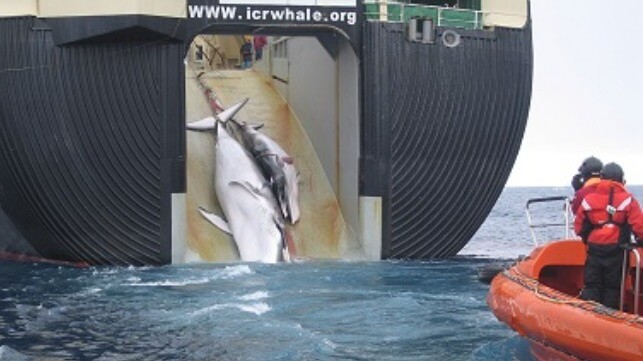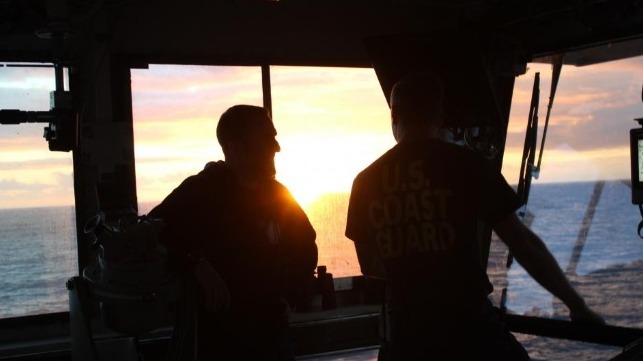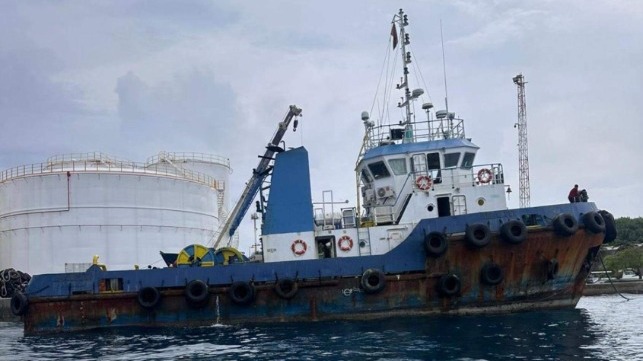Japan's New Whaling Ship Raises Concerns for Conservationists

Japanese whaling industry has gained more capacity with the launch of Kangei Maru, a new whaling mother ship that can process tons of whale meat at sea. The vessel is now the world’s only whaling fleet mother ship, owned by Tokyo-based seafood company Kyodo Senpaku.
The ship is replacing Nisshin Maru, which Kyodo Senpaku retired in November after decades of whaling operations. The vessel became infamous for its whale hunting expeditions in the Antarctic Ocean, which led to frequent clashes with environmental groups.
With the launch of the more sophisticated Kangei Maru, some environmental campaigners have said this could be a hint to Japan’s commitment in expanding whaling in its waters and probably beyond in the Southern Ocean. Built at a cost of $47 million, the 9,300-ton Kangei Maru has a slipway to haul up to 70- ton fin whales, and can store up to 600 tons of meat. This is almost double that of its predecessor and thus, the vessel could remain at sea for longer periods. According to Kyodo Senpaku, the vessel can sail for a range of over 8000 miles.
During this month, Kangei Maru is scheduled to leave its home port of Shimonoseki for an eight-month maiden voyage off the north-east coast of Japan. However, the government has set a catch limit of 379 whales for this year within Japan’s EEZ, including a cap of 167 for minke whales, 187 for Bryde’s and 25 for Sei whales. According to some analysts, this is a relatively small quota for a large vessel such as Kangei Maru, fueling concerns that it might be forced to expand the scope of operation into Antarctica.
Japanese government maintains that it only allows commercial whaling within the territorial sea and its exclusive economic zone (EEZ).
The launch of the new mothership coincides with Kyodo Senpaku’s campaign to boost whale consumption in Japan. Early this year, the company opened two whale meat stores in Tokyo, a move aimed at reviving the shrinking market for whale-related foods. Whale meat was once a staple source of protein in Japanese culture, but consumption began to decline with increased imports of pork, chicken and beef.
As of 2021, only 1,000 tons of whale meat was consumed in Japan from a high of over 200,000 tons in 1962, according to data by Japan’s ministry of fisheries and agriculture.
Meanwhile, the ocean conservation group Captain Paul Watson Foundation has announced that it is acquiring a new vessel, the Bandero, aimed at combating illegal whaling in the Southern Ocean. The organization said that it is responding to the launch of Kangei Maru, and asserted that the new Japanese ship was designed with ability to reach Antarctica.
“If Japan cancels their plans to return to the Southern Ocean Whale Sanctuary, our foundation will target the destructive Krill fishery in the Southern Ocean,” said Omar Todd, CEO of the Captain Paul Watson Foundation.
Japan ended its Antarctica whaling program in 2018 following an order from the international court of justice. In the same year, Japan also withdrew its membership from the International Whaling Commission, the global body that regulates whaling.










 George Galloway MP with Shabaz Sarwar who unseated Manchester City Council's Deputy Leader Luthfur Rahman at Thursday's local elections (Image: Sean Hansford | Manchester Evening News)
George Galloway MP with Shabaz Sarwar who unseated Manchester City Council's Deputy Leader Luthfur Rahman at Thursday's local elections (Image: Sean Hansford | Manchester Evening News)